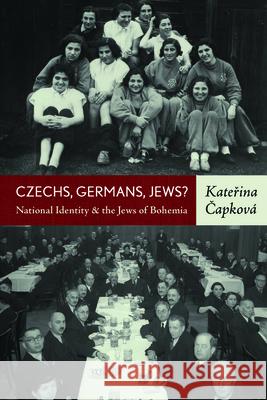Czechs, Germans, Jews?: National Identity and the Jews of Bohemia » książka
Czechs, Germans, Jews?: National Identity and the Jews of Bohemia
ISBN-13: 9781782386797 / Angielski / Miękka / 2014 / 298 str.
"In her well-researched volume, Čapkova uses a broad range of archival and published sources and shows a mastery of the secondary literature, including theoretical materials... Subtly argued and effectively based in the real-life experience of individuals, this book is a fine contribution to the study and understanding of central European Jewry. Fluidly translated; 20 well-chosen illustrations. Highly recommended." - Choice "The book impresses with its great richness of material and detail. In addition to substantial secondary literature, the author used documents, letters, and memoirs from Czech, Austrian, and Israeli archives in Czech, German, Yiddish, Hebrew, and English language, complemented by texts in Slovak and Polish. It is widely taken for granted in historical research that identities, especially national identities, are constructs. Čapkova shows in her important study how necessary it still is to explore these general premiss critically and in depth. Her results offer an important basis for future research into Czech(oslovak)-Jewish identity." - Zeitschrift fur Ostmitteleuropa Forschung "Terms such as identity or assimilation, which are often used without much thought, are shown by the author in their complexity. Although there are a number of books dealing with the history of the Jews of the region, this book's contribution is in the deep analysis of national identity. It also raises issues and concepts that are very important for the understanding of modern European Jewish religious thought. The book is well documented, well translated, and well organized." - Religious Studies Review The phenomenon of national identities, always a key issue in the modern history of Bohemian Jewry, was particularly complex because of the marginal differences that existed between the available choices. Considerable overlap was evident in the programs of the various national movements and it was possible to change one's national identity or even to opt for more than one such identity without necessarily experiencing any far-reaching consequences in everyday life. Based on many hitherto unknown archival sources from the Czech Republic, Israel and Austria, the author's research reveals the inner dynamic of each of the national movements and maps out the three most important constructions of national identity within Bohemian Jewry - the German-Jewish, the Czech-Jewish and the Zionist. This book provides a needed framework for understanding the rich history of German- and Czech-Jewish politics and culture in Bohemia and is a notable contribution to the historiography of Bohemian, Czechoslovak and central European Jewry. Kateřina Čapkova is a research fellow at the Institute of Contemporary History, Prague, and teaches Modern Jewish History at Charles University and NYU in Prague. With Michal Frankl she is the co-author of Nejiste utočistě, a book about Czechoslovakia and refugees from Nazi Germany (2008, in German 2012).
"In her well-researched volume, Čapková uses a broad range of archival and published sources and shows a mastery of the secondary literature, including theoretical materials... Subtly argued and effectively based in the real-life experience of individuals, this book is a fine contribution to the study and understanding of central European Jewry. Fluidly translated; 20 well-chosen illustrations. Highly recommended." · Choice"The book impresses with its great richness of material and detail. In addition to substantial secondary literature, the author used documents, letters, and memoirs from Czech, Austrian, and Israeli archives in Czech, German, Yiddish, Hebrew, and English language, complemented by texts in Slovak and Polish. It is widely taken for granted in historical research that identities, especially national identities, are constructs. Čapková shows in her important study how necessary it still is to explore these general premiss critically and in depth. Her results offer an important basis for future research into Czech(oslovak)-Jewish identity." · Zeitschrift für Ostmitteleuropa Forschung"Terms such as identity or assimilation, which are often used without much thought, are shown by the author in their complexity. Although there are a number of books dealing with the history of the Jews of the region, this books contribution is in the deep analysis of national identity. It also raises issues and concepts that are very important for the understanding of modern European Jewish religious thought. The book is well documented, well translated, and well organized." · Religious Studies ReviewThe phenomenon of national identities, always a key issue in the modern history of Bohemian Jewry, was particularly complex because of the marginal differences that existed between the available choices. Considerable overlap was evident in the programs of the various national movements and it was possible to change ones national identity or even to opt for more than one such identity without necessarily experiencing any far-reaching consequences in everyday life. Based on many hitherto unknown archival sources from the Czech Republic, Israel and Austria, the authors research reveals the inner dynamic of each of the national movements and maps out the three most important constructions of national identity within Bohemian Jewry - the German-Jewish, the Czech-Jewish and the Zionist. This book provides a needed framework for understanding the rich history of German- and Czech-Jewish politics and culture in Bohemia and is a notable contribution to the historiography of Bohemian, Czechoslovak and central European Jewry.Kateřina Čapková is a research fellow at the Institute of Contemporary History, Prague, and teaches Modern Jewish History at Charles University and NYU in Prague. With Michal Frankl she is the co-author of Nejisté útočiště, a book about Czechoslovakia and refugees from Nazi Germany (2008, in German 2012).











